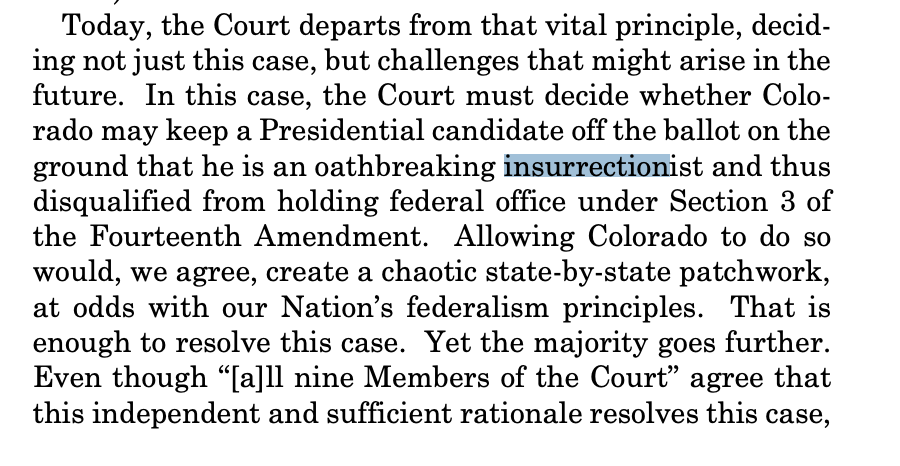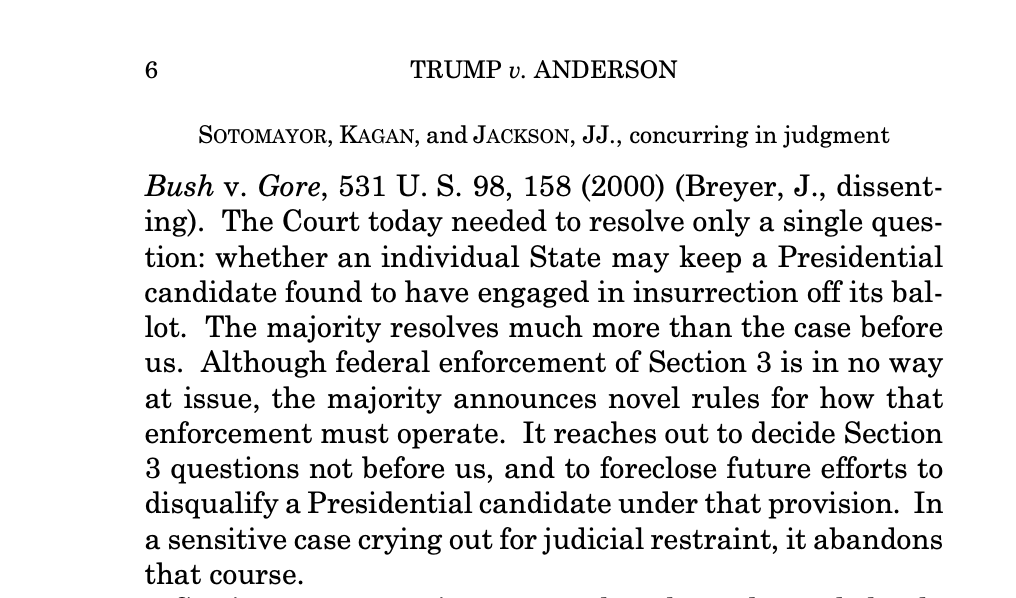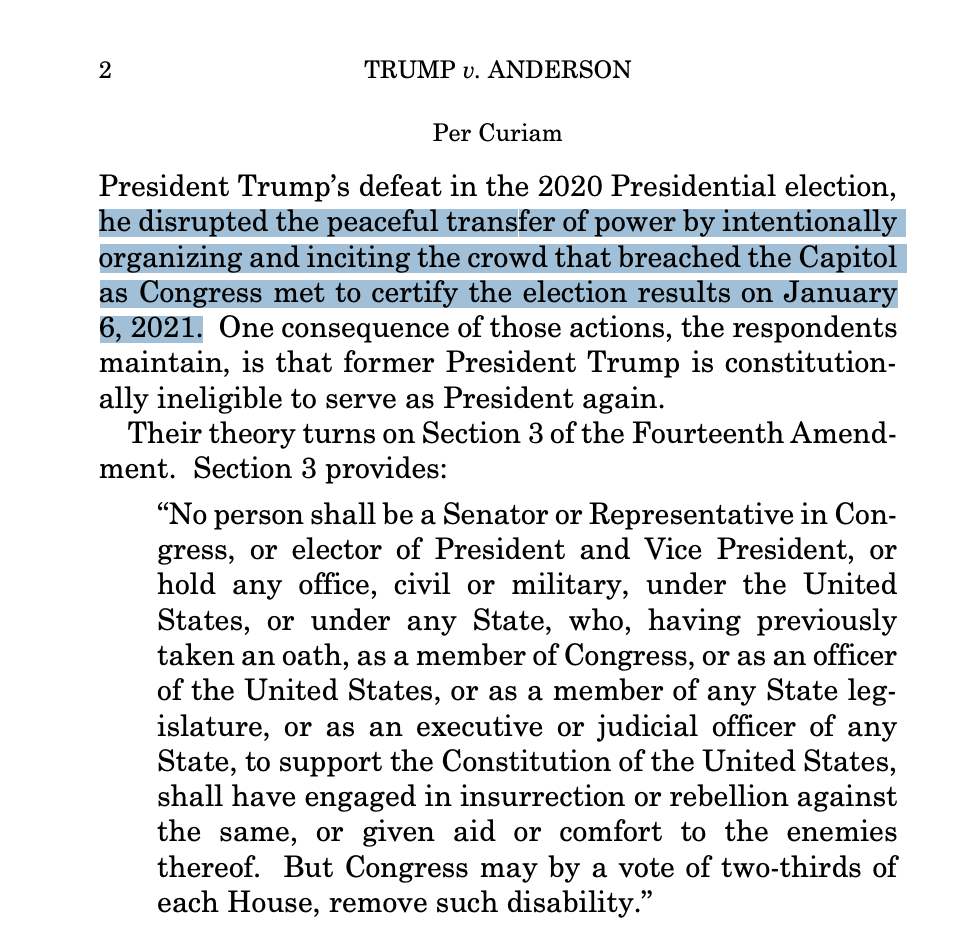
YES means that the US Supreme Court will agree with Colorado Supreme Court that these statements are true.
Overall will resolve YES if the US Supreme Court upholds the ruling.
I will only go by the majority decision.
I will resolve N/A to anything that doesn't appear in the majority decision
🏅 Top traders
| # | Name | Total profit |
|---|---|---|
| 1 | Ṁ750 | |
| 2 | Ṁ133 | |
| 3 | Ṁ93 | |
| 4 | Ṁ47 | |
| 5 | Ṁ40 |
People are also trading
See my comments below. My current plan is to resolve:
Self-executing NO
Overall NO
Applies to the President Y̶E̶S̶ N/A (see my latest comment below)
And N/A the rest.
You have 24 hours to convince me I'm wrong. I'll also read law blogs and see what they say in that time.
@GCS I agree with all of those. I think the N/A's should be uncontroversial, and I think the ruling that a candidate could be excluded by an act of Congress would imply that it does in fact apply to the president.
@GCS Re: Insurrection...they did not disagree that it was an insurrection, but they did disagree with the application of Section 3 by states superseding Federal legislation.
So I don't think you can N/A that one. Citations:
From the concurring judgement, they said that the main question was whether the candidate found to have engaged in insurrection, therefore X (state keep a Presidential candidate off the ballot).
From the first page:

from the last page:

The concurring opinion mentions the word, "insurrection" or "insurrectionist" 12 times. They were saying that 1/6 was an insurrection. This constitutes text in a concurring decision which talks about insurrection (regardless of whether or not this was the only thing talked about).
The Majority decision does mention insurrection as well, 6 times, but mostly as a demonstrative artifact to basically say, "yeah, here's what the SCOCO found, we're not questioning that, we're questioning State Enforcement of a Constitutional Rule."
As to whether this had to do with the events of January 6th, 2021, as opposed to the sum total of all events over time, the majority DOES specifically mention January 6th, 2021 on page 2, in terms of its relevance toward the question:

@PatrickDelaney
I appreciate the detailed response. But I am still going to N/A this one.
In the description I said I would only consider the majority opinion. I stated this originally because I was afraid that the ruling would be longer, more detailed, and potentially have conflicting opinions. This wasn't the case but I have to stick to what I said.
In the majority opinion all mention of insurrection was used to summarize the case. The consensus among lawyers seems to be the only thing that was decided was the issue of self executing and that the supreme court specifically did not rule on whether Jan 6 was an insurrection.
I'll leave this unresolved until tonight. If you can link me to some reputable law discussions that agree with your opinion, I'll reconsider.
Section 3 is self executing will resolve NO.
First page.
"Because the Constitution makes Congress,
rather than the States, responsible for enforcing Section 3
against federal officeholders and candidates, we reverse."
Section 3 applies to the President.
I'm tempted to resolve this YES because of section 1 page 5. It's the only text that isn't about the (lack) of State's rights in excecuting section 3
"For its part, the Colorado Supreme Court also concluded
that there must be some kind of “determination” that Sec-
tion 3 applies to a particular person “before the disqualifi-
cation holds meaning.” App. to Pet. for Cert. 53a.
The Constitution empowers Congress to prescribe how
those determinations should be "made.
@GCS I think the court intentionally did not decide on whether section 3 applies to the president. They just said that congress should be the one to interpret and execute that section.
That's what they mean by "The constitution empowers congress to prescribe how such determinations should be held"
Which to me means Congress can determine who it applies to, including a President. The key is that a President is no different than a Senator or "officer of the United States"
But I'll definitely lean on law blogs on this one. I'm sure the lawyers arguing about this the past few years will post some good content on it.
@GCS I think it's pretty simple. The court didn't say that the president is an officer of law, then this is a NO. They didn't say he isn't, but that's not the same.
I'll be happy to change my opinion according to what actual lawyers say, so that seems like a good plan.
@GCS I think you're right. Check out part A paragraphs 2-4 which focuses on scope of application. They basically say they won't touch the question of who section 3 even applies to and kick that responsibility back to congress through section 5 along with enforcement.
I'm not sure if I'm just feeling extra cynical but it looks like they even threw in a joke about Congress acting in good faith. Or as Senator Howard put it at the time the Amendment was framed, Section 5 "casts upon Congress the responsibility of seeing to it, for the future, that all the sections of the amendment are carried out in good faith.”
I am flipping on this and am now thinking I will resolve N/A. I hate resolving N/A but here is my reasoning.
1) I could find no legal blog or any of the lawyers arguing the "officers/offices" definition claiming arguing that the Supreme Court ruling implies section 3 applies to the president
2) The majority opinion clearly states the only thing they are deciding on is if a State can enforce Section 3
3) Compare this the "Jan 6 was an insurrection". I think they clearly did not rule on the definition of an insurrection. And while it seems obvious to me that by giving Congress the ability to enforce section 3 they are strongly implying that it can apply to President - it does not seem obvious to me that Congress can classify anything as an insurrection. Because of this inconsistency I think my interpretation is just wishful thinking.
I am now more confident that any enforcement action by Congress will definitely end up back at the Supreme Court and they will determine if how Congress enforced Section 3 is appropriate.
I will hold off on resolving this until tonight. Things that will change my mind to resolve YES - a link to a lawyer saying that the ruling means section 3 applies to Presidents.
@GCS This makes sense to me. Really, the only reason it feels like SCOTUS agreed that Section 3 applies to the president is because it seems so obvious on its face that it does, that unless SCOTUS explicitly disagreed or called it into question, it feels like agreement. But if they didn't actually say whether or not it applies, it makes sense to resolve it N/A.
https://adamunikowsky.substack.com/p/is-the-supreme-court-seriously-going-40f
A good discussion, with predictions!
Looks like the probabilities here are pretty in line with this guy. Good job everyone
@Najawin N/A for anything not discussed or discussed neutrally.
My minimum bar for resolving YES / NO is that the majority opinion suggests it's likely be true / false, even if they don't technically rule on it.
I think you are right that people should think about the implications of what will be said in the whole decision - but you underestimate the likelihood some of these will be discussed positively.
For instance self-executing is unlikely to N/A, and you probably can't resolve "Engaging" unless you resolve insurrection.
@GCS Self executing is also the most likely one they'll use to junk it. Either that or due process. They'll then completely ignore everything else.